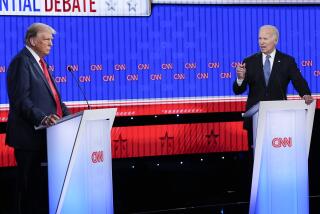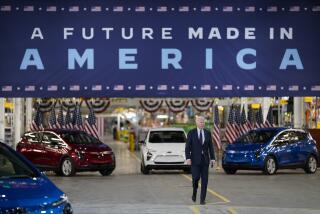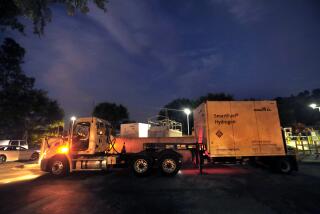Presidential debate: What climate crisis? A lot of hot air on energy
Watch news clips of Tuesday night’s presidential debate and chances are that the back-and-forth between President Obama and GOP challenger Mitt Romney on energy policy will loom large -- not because of the policies under discussion, which were a rehash of old talking points, but because of the playground-style sniping (“Did not reduce drilling on federal lands!” “Did so!”) that might have marked a new low point in the history of such debates. For anybody who cares which man was telling the truth in that embarrassing exchange (they both were, sort of), Politifact has a good analysis. I was more intrigued, though, by what the candidates didn’t talk about.
Not once was the term “climate change” uttered during the debate, despite the fact that Obama’s energy policies don’t make a lot of sense without reference to the carbon problem, and Romney’s don’t make any sense when one takes it into account. You’d think that would mean Obama, at least, would want to bring it up. Instead, he seemed to be twisting himself into knots trying to come up with other reasons for boosting renewable power and energy conservation.
It’s not as though Obama doesn’t get it. Last month, Obama and Romney were invited to answer 14 questions on key scientific issues, including climate change, of which Obama wrote that it was “one of the biggest challenges of this generation.” He went on to tout his administration’s “historic standards reducing greenhouse gas emissions from our vehicles” (note that he mentioned greenhouse gases, not fuel economy), its investments in clean energy, Environmental Protection Agency emission limits for coal-fired power plants and reductions in carbon pollution by the federal government.
DEBATE LOG: Second Presidential Debate
But that was for readers of Scientific American, most of whom presumably understand something about climate science. His message for the general public is quite different. In Tuesday’s debate, he brought up some of the same policies he mentioned in the questionnaire but with a very different rationale. This time, the reason he cited for his administration’s tough new fuel economy standards was that “you’re going to end up going twice as far on a gallon of gas.” The purpose for the investments in clean energy, this time, was to reduce oil imports. And he continued to tout his self-defeating “all of the above” energy strategy by bragging about the way his administration has boosted oil drilling on public land and invested in “clean coal” technology, which he surely knows is a contradiction in terms.
It’s not just that it’s painfully disingenuous for Obama to claim climate change is among our generation’s biggest challenges while touting some policies that will make it worse; it’s that virtually all Republicans and, I suspect, many Democrats realize he’s not telling the truth about the reasons for those policies that actually help address carbon emissions. Yes, you can explain away tighter fuel economy rules by saying they would lower oil imports and, by lowering demand, oil prices. But you can’t justify the EPA’s stepped-up regulations on coal plants without reference to climate change; if there were no such phenomenon, it would make no sense to cut back on greenhouse gases. Obama’s silence on his true motivations gave Romney room to pounce, with the GOP contender bemoaning the coal industry jobs that stand to be lost as the EPA cracks down.
Romney is at least consistent on this issue, even if he’s consistently wrong. On the Scientific American questionnaire, he conceded that “the world is getting warmer, that human activity contributes to that warming, and that policymakers should therefore consider the risk of negative consequences.” But he goes on to claim the science isn’t well settled (actually, it is) and that further research is needed (further research is always needed, but that’s not a justification to fail to act in the face of overwhelming evidence). His strategy calls for eliminating most restrictions on coal and oil production while investing some government money in clean technologies. This not only would fail to reduce U.S. carbon emissions; it would make them immeasurably worse.
PHOTOS: The presidential debate
So how do you justify failing to act even after you’ve acknowledged the problem exists? By blaming China, a familiar whipping boy for Romney. If China doesn’t clean up, why should the U.S. put itself at a competitive disadvantage by doing so? Among the answers: China is already investing far more than the U.S. in clean energy; the greenhouse gases in the atmosphere were accumulated over the course of centuries by emissions for which the U.S. is more responsible than any other country, and thus simple fairness dictates we should be acting first to reduce them; the U.S. has no moral authority to insist on reductions from other countries when it’s making no sacrifices of its own; and by failing to encourage more renewable power development, we’re giving up a chance to dominate a key industrial segment of the future.
Romney has a very good reason to avoid mentioning climate change during debates -- because his entire energy strategy is based on pretending it doesn’t exist. Obama’s reticence is more puzzling but no doubt based on political expediency. With the economy struggling, American voters are much more focused on jobs than on pending environmental catastrophe. Meanwhile, a conservative disinformation campaign about global warming seems to have genuinely swayed the public, with polls in recent years showing that fewer and fewer Americans see it as a genuine concern. But that may be changing.
As the effects of climate change become blazingly obvious to non-scientists -- quite literally, with extended droughts in the Western U.S. leading to record-setting wildfires in recent years -- attitudes may be shifting back to where they were before the economic crisis. A national survey released Monday by the Pew Research Center for the People and the Press found that 67% of Americans say there’s solid evidence that the Earth’s average temperature has been rising over the last few decades, up 4 points since last year and 10 points since 2009. Even Republicans seem to be increasingly believing the evidence of their senses over what they’re hearing on Fox News: 48% say there’s solid evidence of warming, up from 35% in 2009. What this means is that talking about climate change may not be the political poison it was as recently as last year. That’s something the Obama camp should keep in mind when prepping their candidate for the final debate.
Obama didn’t go far enough in his answer to Scientific American. Climate change isn’t just a key generational challenge. The switch from fossil fuels to clean power represents the biggest scientific, economic and environmental challenge our species has ever faced. Failing to make this switch will have devastating consequences for this and future generations. Blithely ignoring all of this isn’t leadership; it’s a disgrace.
ALSO:
Solar power, and tortoises too
McManus: Who wins a tied debate?
Subscribe to Dan Turner on Facebook
More to Read
A cure for the common opinion
Get thought-provoking perspectives with our weekly newsletter.
You may occasionally receive promotional content from the Los Angeles Times.










